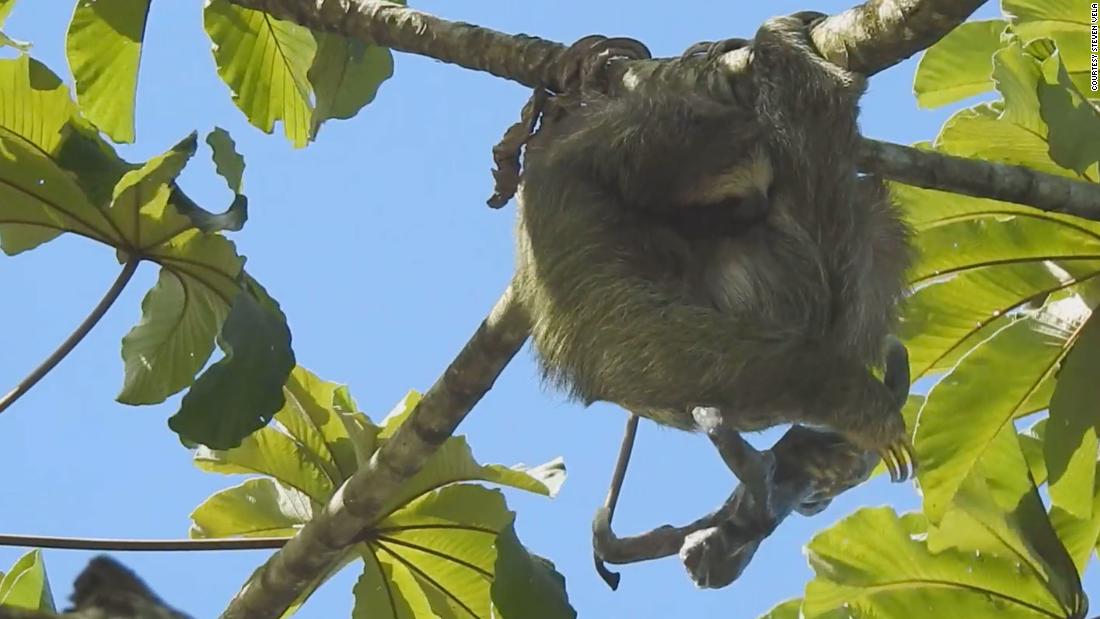(CNN) — It turns out the sloth, a notoriously slow moving animal, can actually move pretty fast. Particularly when a baby sloth’s life is dangling in the balance — quite literally.
A tour group in Costa Rica stumbled across the birth of a three-fingered sloth late last month and witnessed something both alarming and mesmerizing (we’ll let you decide on that).
In a heart-stopping video, a brown-throated sloth (Bradypus variegatus) had to think fast, and quickly curl her arm around her falling infant, who was plunged from the branch almost instantly after being delivered into the world.
“It’s definitely the weirdest thing I’ve ever seen,” Steven Vela, the tour guide who spotted the mammals, told CNN.
In a video he recorded, the baby sloth can be seen suspended in the air for several seconds, with only an umbilical cord preventing it from plummeting to the ground.
The later stages of the video are less anxiety-filled, as the mother takes the baby in an embrace, and appears to comfort it. Capturing an occurrence like this is extremely rare, according to Dr. Rebecca Cliffe, the founder of the Sloth Conservation Foundation in Costa Rica and someone who has been working sloths for more than a decade.
“To see a three-fingered sloth give birth is something that very few people have been lucky enough to witness,” she said.
“Sloths are secretive animals that live high in the rainforest canopy and specialize in camouflage. To just see one in the wild is lucky, but to observe one giving birth out in the open is very special.”
But with all her years working with sloths, Cliffe has witnessed a similar birth.
“I was lucky enough to witness a very similar event in 2013. One of the sloths that I was tracking and studying for my PhD, climbed down from her tree and gave birth just 2 meters away from me.
The birth was surprisingly similar to the one captured on video recently — the baby fell and the umbilical cord got tangled around a vine which made everything a little bit chaotic. Thankfully the baby didn’t fall, but it was another example of the umbilical cord saving the day!”
Steven Vela has been a tour guide with Canoa Adventura in La Fortuna, Costa Rica, for eight years and said he’s never seen anything like it.
While tourists can usually see monkeys, snakes, iguanas and toucans, on this occasion the tour group got “very lucky,” he said.
“I could not believe what I was seeing. I was super excited,” he said. “We were at the right moment and at the right time. I guess I will never see anything like that again.”
Do sloths usually give birth in such a nerve-wracking fashion? And does the umbilical cord often have such a stress-inducing role to play?
“I suspect that this may happen in a surprisingly high number of sloth births,” Cliffe said. “From the limited number of three-fingered sloth birth observations that we know about, this has happened in a high proportion of cases.
We also know that in almost every case the mother sloth has descended to quite a low height in the canopy to give birth. This is likely a precautionary measure to prevent injury to the baby in case it does fall to the ground. It also reduces the distance that the mother needs to travel to collect her baby from the ground in case of a fall,” she added.
Regardless of the umbilical cord, Cliffe said “citizen science observations” like this help provide important insight on a topic that is poorly understood from a scientific perspective.
And as for the two sloths? Both are doing well and have remained in the same area, according to Vela.
